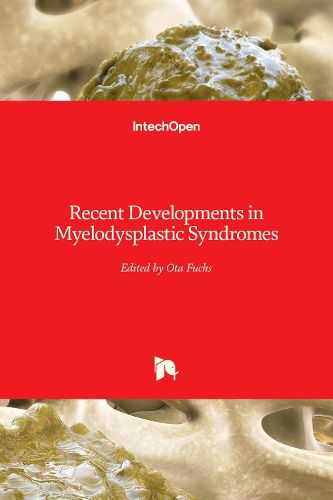Readings Newsletter
Become a Readings Member to make your shopping experience even easier.
Sign in or sign up for free!
You’re not far away from qualifying for FREE standard shipping within Australia
You’ve qualified for FREE standard shipping within Australia
The cart is loading…






This book deals with the rapid progress in the area of myelodysplastic syndromes (MDS). MDS are a group of age-associated heterogeneous malignant bone marrow stem cell disorders. MDS are characterized by ineffective hematopoiesis, which leads to refractory cytopenias and to clonal instability. Patients with MDS have myeloid dysplasia, intramedullary apoptosis and an increased risk of transformation to acute myeloid leukemia (AML). The use of next generation sequencing has allowed for the identification of molecular mutations in several genes in about 90% of MDS patients. Several mutations will likely be incorporated into future prognostic scoring systems for MDS. About 50% of MDS cases are characterized by the presence of cytogenetic abnormalities. The correct morphological and cytogenetic analysis interpretation plays an important role in diagnosis and prognosis of these disorders. Cell death and an inflammatory gene signature are associated with MDS. Better understanding of the genetic and molecular mechanisms of MDS pathogenesis provides an opportunity for new treatment strategies to be developed. Promising novel therapies targeting pathophysiological mechanisms of MDS are being studied but the drugs currently used in MDS therapy remain limited. The only curative therapy for MDS is allogeneic hematopoietic stem cell transplantation. Recent advances in strategies to minimize transplant-related toxicity make this treatment possible for more MDS patients who are sufficiently fit.
$9.00 standard shipping within Australia
FREE standard shipping within Australia for orders over $100.00
Express & International shipping calculated at checkout
This book deals with the rapid progress in the area of myelodysplastic syndromes (MDS). MDS are a group of age-associated heterogeneous malignant bone marrow stem cell disorders. MDS are characterized by ineffective hematopoiesis, which leads to refractory cytopenias and to clonal instability. Patients with MDS have myeloid dysplasia, intramedullary apoptosis and an increased risk of transformation to acute myeloid leukemia (AML). The use of next generation sequencing has allowed for the identification of molecular mutations in several genes in about 90% of MDS patients. Several mutations will likely be incorporated into future prognostic scoring systems for MDS. About 50% of MDS cases are characterized by the presence of cytogenetic abnormalities. The correct morphological and cytogenetic analysis interpretation plays an important role in diagnosis and prognosis of these disorders. Cell death and an inflammatory gene signature are associated with MDS. Better understanding of the genetic and molecular mechanisms of MDS pathogenesis provides an opportunity for new treatment strategies to be developed. Promising novel therapies targeting pathophysiological mechanisms of MDS are being studied but the drugs currently used in MDS therapy remain limited. The only curative therapy for MDS is allogeneic hematopoietic stem cell transplantation. Recent advances in strategies to minimize transplant-related toxicity make this treatment possible for more MDS patients who are sufficiently fit.